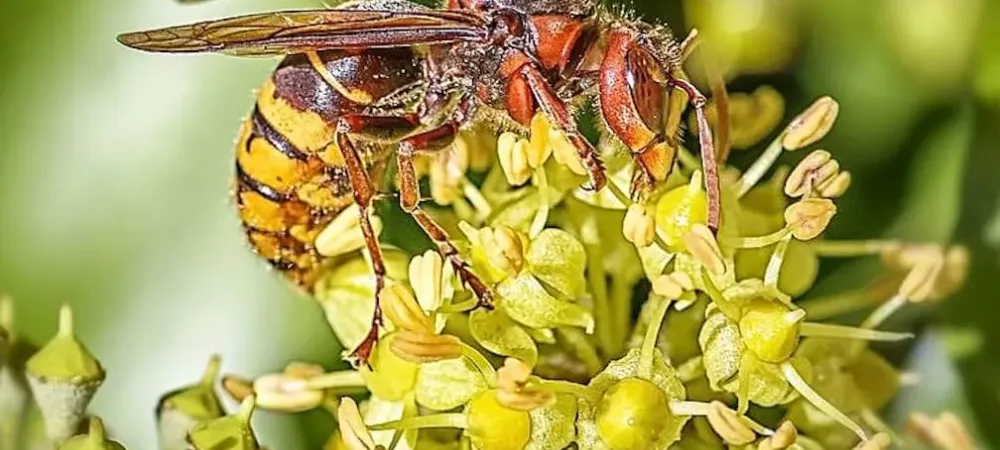8 Facts About Hornets

Did you know that hornets are a type of wasp? Most people do, except they might have trouble telling them apart from other types of wasps, especially the yellow jackets. However, hornets are very different from other wasps, they are bigger and come in at least twenty species, the majority which is primarily found in Asia. Still, hornets exist in other parts of the world, including North America, Europe, and Africa.
When it comes to hornets, perhaps what most people could never disagree on is their mean sting which tends to be fatal to some people. But apart from that, hornets are interesting insects. Here are eight facts you should know about hornets:
1. The Difference with Wasps
Perhaps the best term to describe the relationship between hornets and other types of wasps, is “cousin”. This means that as much as hornets are from the larger wasp family, they are merely a subset. Like wasps, they belong to the vespidae family, however, both of these species have their own sub-species and different life cycles which sets them apart.
There is one notable difference between wasps and hornets. Hornets are much bigger than wasps, at least an inch difference. They also come in different colors with wasps sticking more to black and yellow.
2. Not Exactly Aggressive
It’s no secret that hornets are pretty scary, especially because of their sting which carries five times more poison than that of an ordinary wasp. They also prefer to attack in large numbers which makes them even more dreaded. However, the surprising fact is that they are actually not as aggressive as we think.
Hornets are shy insects and tend to live in multitudes away from disturbances, but like most insects with an organized colony, hornets do not hesitate to attack when they perceive a threat to their home.
3. Nesting
Hornets have different living preferences which depend on the species. They are typically known to build their nests above ground in high areas like treetops, roofs, hollow trunks and basically any above-ground spot they find suitable. However, there also some species that prefer to nest in the ground where they supposedly find security and privacy. Some of the prospective spots for ground-nesting hornets are abandoned burrows, fields and shaded dry areas.
4. Hornets Prey on Bees
It might come as a surprise that hornets are a nightmare for bees, especially when we know that the latter is very intelligent and just as dangerous. However, bees are only a danger to humans and other animals when they attack, but not so much to hornets. Hornets are five times larger than your average European honey bee and pretty powerful that bees don’t stand a chance. A single giant hornet can kill up to forty honey bees a minute; this means that it would only take a few giant hornets to destroy an entire colony.
The reasons why bees are a favorite for hornets is that they are the perfect source of protein, produce sweet food and are basically easy targets.
5. They Possess a Potentially Lethal Sting
The venomous sting of a hornet is what makes it dangerous to humans. Considering the fact hornets are relatively peaceful, cases of stings are rare. A hornet’s venom on its own is not that lethal, but the huge size of the insect will ensure it releases a lot of it making it the one insect that releases the most venom per sting. And unlike bees that only sting once, hornets have no problem attacking multiple times.
6. Nature’s Pest Control
Hornets and their huge sizes and predatory nature are not a coincidence. These insects are nature’s pest control s they prey on other insects like aphids.
7. Football-Shaped Nests
Hornets that build their nests on tree-tops tend to make football-shaped nests. These nests are made out of saliva and chewed wood and have a paper-like texture; the nests have sections with rows where the queen lays her eggs.
8. One Year Lifespan
The entire colonies of hornets only last a year. The queen’s life-cycle is one year as she stores sperms inside her in winter and utilizes it to fertilize eggs in spring. Worker hornets live from spring to summer while drones die right after fertilizing eggs.
Although hornets are not aggressive to humans, this fact should not be taken with a grain of salt. Since they cannot tell your motives, they are sure to attack you if you were to approach their colony knowingly or not. For this reason, hornets are considered hostile and if you notice signs of their habitation in your property, the best course of action is to inform pest control. Here at Big Time Pest Control, we offer residential pest control services in Northern California cities such as Chico, Anderson, Sacramento, Redding, and more!
